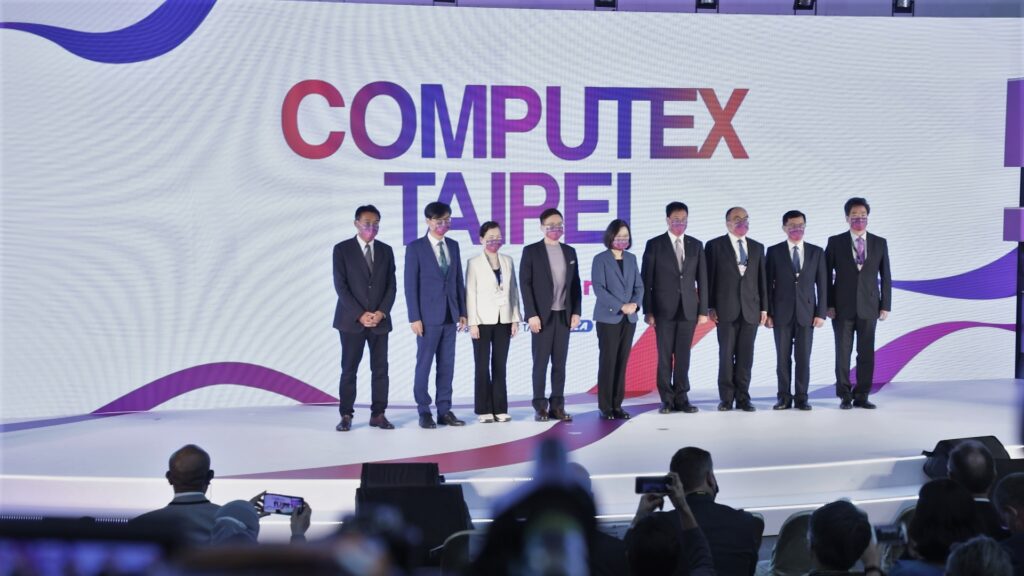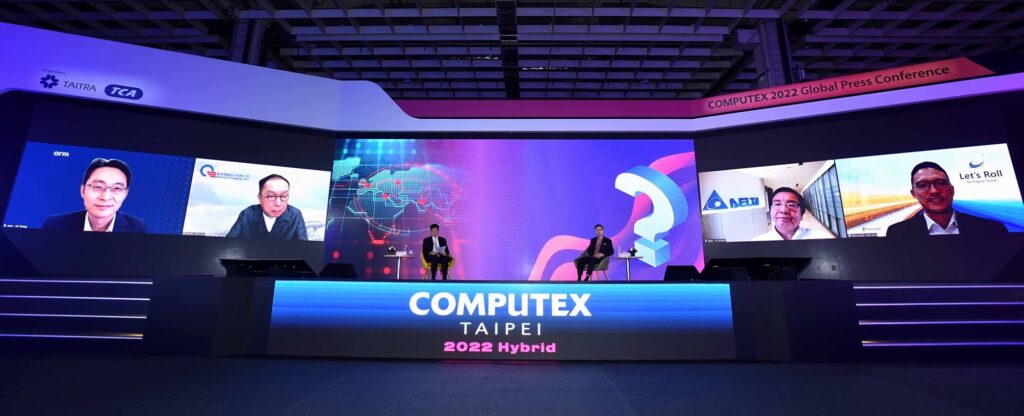ASIA ELECTRONICS INDUSTRYYOUR WINDOW TO SMART MANUFACTURING
COMPUTEX Tracks Future Trends, Proven Industry Grit
COMPUTEX 2022 opens Tuesday, marking the return of the physical exhibition after two years of hiatus because of the novel coronavirus (COVID-19) pandemic. One of Asia’s largest ICT event will track the importance of semiconductor and related technologies that are spurring innovations.
At the same time, event organizer Taiwan External Trade Development Council (TAITRA) also expects the four-day event to unlock future trends that will shape the landscape of the industry. Aside from physical exhibition, COMPUTEX 2022 will continue to retain its virtual platform, COMPUTEX DigitalGo Online, which will run for two weeks.
Foundation of Taiwan Economy
Taiwan President Tsai Ing-wen delivered a speech to mark the opening of the annual event and said the ICT industry is an important foundation of Taiwan’s economy and is critical to the transformation of other industries such as industrial and medical.

“Future AI, quantum computers, and cloud computing will be highly dependent on chip technology. We are expecting Taiwan’s high-end hardware advantages could extend to more fields,” said President Tsai.
“The Ministry of Digital Development will accelerate the digital development of Taiwan for keeping Taiwan’s advantage and leading position,” she added.
James Huang, TAITRA Chairman, said in the same opening ceremony win-win solution is possible amid the pressing challenges the global stage are experiencing. “In dealing with our most pressing challenges such as the pandemic, supply chain disruptions or even geo-political issues, we can find new possibilities and win-win solution with the power of technology. The mission of COMPUTEX is to introduce those technologies to the world and help make a difference.”
Earlier Monday, during the event’s global press conference, Huang said this year’s COMPUTEX will introduce more technological platforms to unlock future trends.

“COVID-19 has brought severe impacts on supply chains and reshaped the global economy, urging the global ICT industry to adapt to unexpected challenges…This year’s show is hybrid and continues its positioning for building global technology ecosystems. COMPUTEX 2022 creates this tech-forward platform to unlock future trends as well as to debut products,” said Huang.
Turning Challenges to Opportunities
The global press conference held at the Taipei Nangang Exhibition Center tackled the digital resilience of the global ICT industry, which featured select key players of Taiwan’s ICT industry. Most importantly, Huang noted that despite the challenges in the industry, such as supply chain disruptions, trade wars, as well as the armed conflict in Ukraine, innovations never stopped. Particularly, he noted the continuing adoption of artificial intelligence and internet of things (IoT) in the ICT realms that are spurring growth across the value chain.

Aside from Huang, other players who attended the global press conference include Paul Peng, Chairman of Taipei Computer Association; Barry Lam, Founder and Chairman of Quanta Computer; and Dr. Tzi-cker Chiueh, Director General of Delta Research Center. In addition, CK Tseng, President of Arm Taiwan, and Ken Sun, General Manager of Microsoft Taiwan, also graced the said event.
Moreover, they took turns to discuss how the ICT industry can turn the challenges of the pandemic into opportunities. Thus, creating a better future with digital technologies despite the global challenges.
Pandemic Accelerates Metaverse, IC Innovations
Incidentally, the challenges brought by the pandemic has led to consequential growth in the industry. Particularly, Quanta Computer’s Barry Lam noted demand for mobile computing and cloud computing has increased exponentially the past two years. In the future, the market will require more innovative technologies to create new application scenarios coupled with a more flexible global supply chain. Moreover, the time to market will be the key to success.
On the other hand, Arm Taiwan’s CK Tseng, suggested, “the pandemic has highlighted the importance of semiconductors in the tech industry, driving more companies to accelerate their technical innovations via advanced semiconductor technology.”
In addition, Tseng noted, “We are working with our partners to redefine the future of computing, delivering technology that will address the demands of AI, autonomous systems, cloud computing, the metaverse and much more.”
Strengthens Resilience of Production
Despite the global challenges, building digital resilience is the key to steady growth under the new normal. Dr. Tzi-cker Chiueh, of Delta Research Center, noted the need for enterprises to proactively devise comprehensive alternatives to their end-to-end business flows.
At the same time, he also noted to rigorously ensure they can go through challenging disruptions in the global economy. In addition, he also cited the adoption of more IoT technologies. This, he said, will strengthen the resilience of smart manufacturing production lines and the operations of smart green buildings.
As 5G and AIoT technology become more prevalent, and businesses accelerate the pace in which they digitally transform, Ken Sun of Microsoft Taiwan, believes raising tech intensity, embracing cloud and harnessing the power of data will be key in building business and organizations’ digital resilience. Sun said that the cloud not only brings tremendous opportunity to accelerate innovation and create new business models. Most importantly, it allows industries to thrive and grow in the post-pandemic world.




